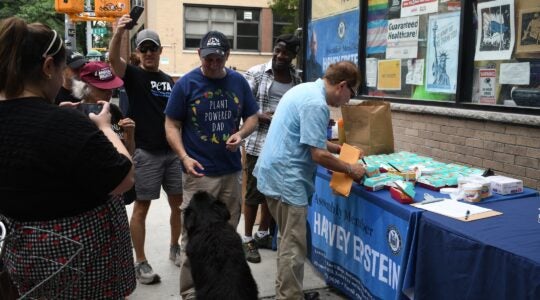The torrential rain that caused flooding throughout the Poconos played havoc with sleep away camps last week, forcing the closing of roads that cut off deliveries, trapping people in camps and forcing one camp to relocate half the campers to Kutsher’s Country Club after the entire camp spent a night in a local school gym. Most of the camps around Lake Como, Pa., said they were forced to delay the opening of camp for several days because roads to the camps were impassable. Although most camps said they sustained little if any damage themselves, a 50-foot tree crashed through the ceiling of an unoccupied girl’s bunk at Pinemere Camp in Stroudsburg, Pa. Camp Tel Yehudah, the national senior leadership camp of Young Judaea in Barryville, N.Y., experienced extensive flooding in part of the camp.
The flooding was so bad in the lower part of Camp Tel Yehudah, that the entire camp — 440 youngsters who started camp a week earlier and 200 counselors and staff — was evacuated to Eldred High School on June 28. “As soon as we heard how much the Delaware River was supposed to rise — about 17 feet — we didn’t want to take a risk,” said Yarden Elhanan, a camp assistant.
The Delaware is normally only a few feet deep. At its height during the storm, the river crested at 33 feet, well above flood stage.
Meir Housman, director of Camp Tel Yehudah, said his staff was ready “to evacuate before emergency services arrived to help us.”
The camp was moved to the school gym, where Housman said everyone slept in sleeping bags they had brought. The Red Cross brought in cases of vegetarian dinners from New York.
“It was pretty impressive,” Housman said.
The next day, the younger campers returned to camp and the older campers were bused with their counselors to Kutsher’s in Monticello, where they stayed until Sunday.
A front desk clerk said the hotel accommodated 234 campers and counselors.
“They’re using the facilities and having meals with other guests,” he said. “They’re living the life.”
Asked about the cost, Housman said: “We’re waiting for the bill. It’s going to be an arm and a leg. We’re checking our insurance. But the goal was the health and safety of the campers and to make sure that the program continued running.”
Housman said the flood made a camp dining room and some staff rooms unusable.
Aaron Selkow, executive director of Pinemere Camp, said seven girl campers and two counselors were out of their bunk when a tree toppled over and landed on the roof. The next day, a local tree service surveyed all of the trees and trimmed some as a precaution.
“It was to make everyone feel comfortable,” Selkow said, noting that it had rained non-stop from June 23 until June 28.
“Had we not had our children arriving on Sunday [June 25], we most likely would have delayed [the opening],” he said. “We enacted a crisis response program that was in effect Monday through Wednesday,” Selkow noted. “That involved double checking all activities to make sure the programs were safe. We worked in a higher alert status.”
Although flood waters receded by last weekend, one main road to the Lake Como area, Equinunk Road, was out of service because a bridge was washed away, killing an elderly man whose car was swept off the bridge.
David Fischberger, director of Camp Lavi, a coed Orthodox camp, said that although the floodwaters did not flow into his camp, which is located about 1.5 miles up Fork Mountain, it created havoc with access roads and caused him to delay the opening of camp from June 28 to July 2. But although there were no campers there, there were 200 staff members who endured what he called an “ordeal.”
“We went into a complete lockdown,” he said. “Access roads became impassable because little creeks overflowed and washed out bridges. What was normally a quiet little stream beside the road became a torrent of swirling water. … Under normal conditions there are three roads coming into the camp; right now, only one is passable.”
Road conditions forced several vans traveling to Camp Lavi to become stranded at the Inn at Starlight Lake, a bed and breakfast a few miles from the camp, according to Rabbi Gotch Yudin, director of Camp Morasha at Lake Como.
“There were about 30 or 40 people stranded at the inn, about two miles from our camp,” he said. “We were privileged to take them in and to host three grandchildren of Rabbi Fischberger.”
At Camp Ramah in the Poconos, Rabbi Todd Zeff said a two-day canoeing trip for 12 girls on the Delaware River was ended after the first day, June 25. “We are very safety conscience and once the Delaware rises 4.5 to 5 feet, we won’t paddle because we don’t feel its safe enough,” he said. Despite the rain, Rabbi Zeff said his camp, to which campers arrived June 22, is at the top of a hill and was able to continue with normal activities with some modifications inside. “Instead of swimming, we did a Red Cross CPR course and counselors did other creative programming,” he said.
At Camp Nesher at Lake Como, Leonard Robinson, executive director of the New Jersey YMHA-YWHA Camps, said the rain “created more leaks than we have ever seen before.”
The New York Jewish Week brings you the stories behind the headlines, keeping you connected to Jewish life in New York. Help sustain the reporting you trust by donating today.




